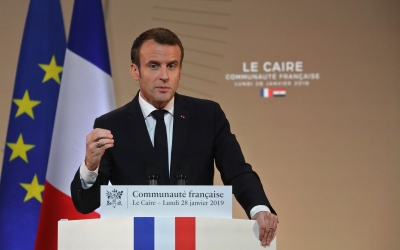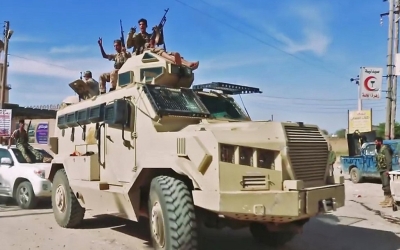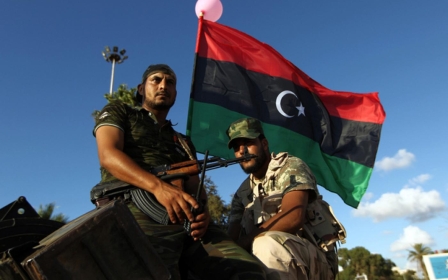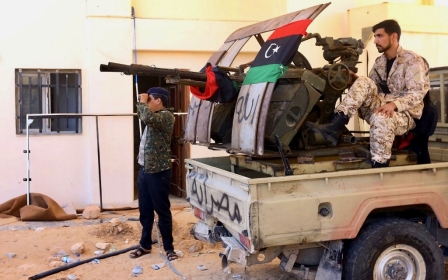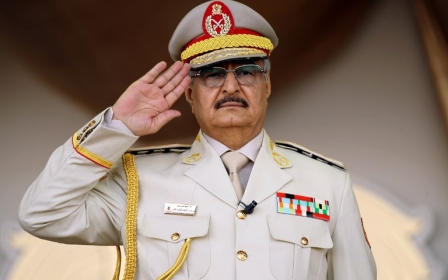Libyan commander Haftar tells French president no ceasefire for now
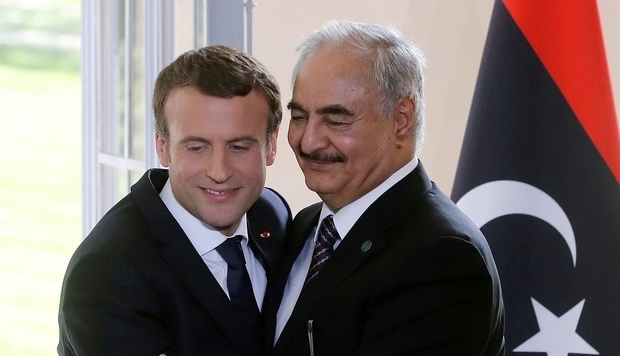
Libyan eastern commander Khalifa Haftar, speaking on Wednesday with French President Emmanuel Macron, ruled out a ceasefire in the war-torn country and said he wanted to rid Tripoli of militias that had "infested" the UN-backed government, a French presidential official said.
The flare-up in the conflict in Libya - which has been gripped by anarchy since Muammar Gaddafi was toppled by NATO-backed forces in 2011 - began in early April, when Haftar's Libyan National Army (LNA) advanced on the capital.
New MEE newsletter: Jerusalem Dispatch
Sign up to get the latest insights and analysis on Israel-Palestine, alongside Turkey Unpacked and other MEE newsletters
The LNA is now bogged down in southern suburbs by fighters loyal to Prime Minister Fayez al-Serraj's Government of National Accord (GNA).
Macron and French officials have for weeks repeated their official support for the GNA and have called for an unconditional ceasefire.
But some European countries, including France, have also in the past supported Haftar as a way to fight against militants operating in the country.
"The distrust we see between the Libyan actors is stronger than ever today," the French official said after the meeting between Macron and Haftar in Paris.
"When the question of the ceasefire was put on the table, Haftar's reaction to this was to ask: 'negotiate with whom for a ceasefire today?'," said the official.
'Infested by militias'
Since April, the battle for Tripoli has killed at least 510 people, forced 75,000 out of their homes, trapped thousands of migrants in detention centres, and flattened some southern suburbs.
It has also forced closures of schools, split families on different sides of the frontline, disrupted electricity access - with water supplies to Tripoli also temporarily disconnected by pro-Haftar forces.
"He [Haftar] considers that the GNA is completely infested by militias and it is not for him to negotiate with representatives of these militias," the French official said.
The official said Macron had asked Haftar to make a public step towards a ceasefire and Haftar responded by saying that an inclusive political dialogue was necessary and he would be ready for it if the conditions for a ceasefire were in place.
However, the official said Haftar had given no indication as to when he would be ready for any potential talks.
The Paris visit followed Haftar's surprise trip to Rome last week for talks with Italian Prime Minister Giuseppe Conte.
Long and bloody conflict warning
Speaking on Euronews television on Wednesday, the GNA's Serraj also appeared to rule out a ceasefire, warning that the fighting would not stop until Haftar's troops had pulled back east.
The United Nations' Libya envoy, Ghassan Salame, said on Tuesday the current fighting could be the start of a long and bloody conflict in the country that could divide it permanently.
Addressing the Security Council in New York, Salame said "many countries" were supplying weapons to the UN-recognised government in Tripoli and to forces led by Haftar.
The former general, who has seized much of the country's east from various militias, is backed by several countries, including the United Arab Emirates and Egypt.
The French official said: "We can clearly see the impasse that exists today between the desire of the international community to say that there must be a ceasefire and a resumption of political discussions and the way in which Haftar sees things with his explanation of the lack of legitimacy of the interlocutors [on the other side]."
The official also said Haftar had rejected suggestions he or forces loyal to him were benefiting from oil sales in the east of the country.
Middle East Eye delivers independent and unrivalled coverage and analysis of the Middle East, North Africa and beyond. To learn more about republishing this content and the associated fees, please fill out this form. More about MEE can be found here.


